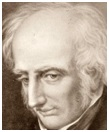|
 |
|
 |
|
|
||
Poetry - Nature and the Environment
William Wordsworth (1770-1850), Daffodils
(1804)
Nature inspired Wordsworth’s (pictured right) poems and this is the most famous:
I wandered lonely as a cloud That floats on high o'er vales and hills, When all at once I saw a crowd, A host of golden daffodils; Beside the lake, beneath the trees, Fluttering and dancing in the breeze. (first verse)
William Wordsworth, Tintern Abbey (1793)
This poem compares:
For I have learned To look on nature, not as in the hour Of thoughtless youth; but hearing oftentimes The still, sad music of humanity, Nor harsh nor grating, though of ample power To chasten and subdue. And I have felt A presence that disturbs me with the joy Of elevated thoughts; a sense sublime Of something far more deeply interfused, Whose dwelling is the light of setting suns, And the round ocean and the living air, And the blue sky, and in the mind of man. (lines 88-99)
William Wordsworth, The Tables Turned (1798) This comments on the
Sweet is the lore which Nature brings; Our meddling intellect Mis-shapes the beauteous forms of things:- We murder to dissect. (penultimate verse)
John Keats (1795-1821), To Autumn
(1819) The English poet’s (pictured right) opening lines describe the beauty of autumn:
Season of mists and mellow fruitfulness Close bosom-friend of the maturing sun.
Henry David Thoreau (1817-62),
Nature The American poet and philosopher (pictured right) prefers the country to the city:
For I'd rather be thy child And pupil, in the forest wild, Than be the king of men elsewhere, And most sovereign slave of care; To have one moment of thy dawn, Than share the city's year forlorn (lines 14-18)
John Clare (1793-1864), I Am
(1865) The English poet (pictured right) describes the spiritual peace that nature gives:
I long for scenes where man has never trod; A place where woman never smil'd or wept; There to abide with my creator, God, And sleep as I in childhood sweetly slept: Untroubling and untroubled where I lie; The grass below--above the vaulted sky. (last verse)
William Blake (1757-1827), The
Tyger The English poet (pictured right) describes the beauty of a tiger:
Tyger! Tyger! burning bright In the forests of the night What immortal hand or eye Could frame thy fearful symmetry? (first verse).
William Blake, Auguries of Innocence (1803) In another poem Blake brilliantly captures nature's
To see a world in a grain of sand And a heaven in a wild flower, Hold infinity in the palm of your hand And eternity in an hour. (first four lines).
Ogden Nash (1902-71), Song of the Open Road
(1932) The American poet (pictured right) comments on how business can obscure the beauty of nature:
I think that I shall never see A billboard lovely as a tree. Perhaps, unless the billboards fall, I'll never see a tree at all. (complete poem)
William Shakespeare (1564-1616), Sonnet
18
Shakespeare (pictured right) comments on the weather’s unpredictability:
Rough winds do shake the darling buds of May, And summer's lease hath all too short a date. (lines 3 and 4)
Robert Browning (1812-89), Home Thoughts, from Abroad
(1845) The English poet (pictured right) describes the joys of the English countryside including (in the penultimate line), the buttercup, described as the children's dower (or gift of nature):
Oh, to be in England Now that April 's there, And whoever wakes in England Sees, some morning, unaware, That the lowest boughs and the brushwood sheaf Round the elm-tree bole are in tiny leaf, While the chaffinch sings on the orchard bough In England—now!
And after April, when May follows, And the whitethroat builds, and all the swallows! Hark, where my blossom'd pear-tree in the hedge Leans to the field and scatters on the clover Blossoms and dewdrops -at the bent spray's edge- That 's the wise thrush; he sings each song twice over, Lest you should think he never could recapture The first fine careless rapture! And though the fields look rough with hoary dew, All will be gay when noontide wakes anew The buttercups, the little children's dower - Far brighter than this gaudy melon-flower! (complete poem)
Christopher Marlowe (1564-93), Passionate Shepherd to His Love
(1599) The English poet (pictured right) shows how nature can fire the passion of love:
That valleys, groves, hills, and fields, Woods or steepy mountain yields.
And we will sit upon the rocks, Seeing the shepherds feed their flocks, By shallow rivers to whose falls Melodious birds sing madrigals. (first two verses)
Benjamin Zephaniah (1958- ), Health Care (1997) The English poet (pictured right) in his rap style tells us to look after the planet:
Those dat sail Tek care of de whales, De strong should seek To strengthen the weak, Lovers of art Should play their part, An all those upon it Tek care of the planet. (last verse)
Edward Thomas (1878-1917), Adlestrop (1917) The Anglo-Welsh poet (pictured right) tells us the beauty and peace of an English village on a train journey during the First World War (in which Thomas was killed):
The name, because one afternoon Of heat the express-train drew up there Unwontedly. It was late June. No one left and no one came On the bare platform. What I saw Was Adlestrop—only the name And willows, willow-herb, and grass, And meadowsweet, and haycocks dry, No whit less still and lonely fair Than the high cloudlets in the sky. And for that minute a blackbird sang Close by, and round him, mistier, Farther and farther, all the birds Of Oxfordshire and Gloucestershire. (complete poem)
Anne Brontë, Lines Composed in a Wood on a Windy
Day (1846) The English poet (pictured right) describes nature's beautiful fascination
And carried aloft on the wings of the breeze; For above and around me the wild wind is roaring, Arousing to rapture the earth and the seas.
The bare trees are tossing their branches on high; The dead leaves beneath them are merrily dancing, The white clouds are scudding across the blue sky.
The foam of its billows to whirlwinds of spray; I wish I could see how its proud waves are dashing, And hear the wild roar of their thunder today! (complete poem) |
|
|
||
|
|
||
| Copyright © wisdomtowin.com 2025 All Rights Reserved | ||
|














